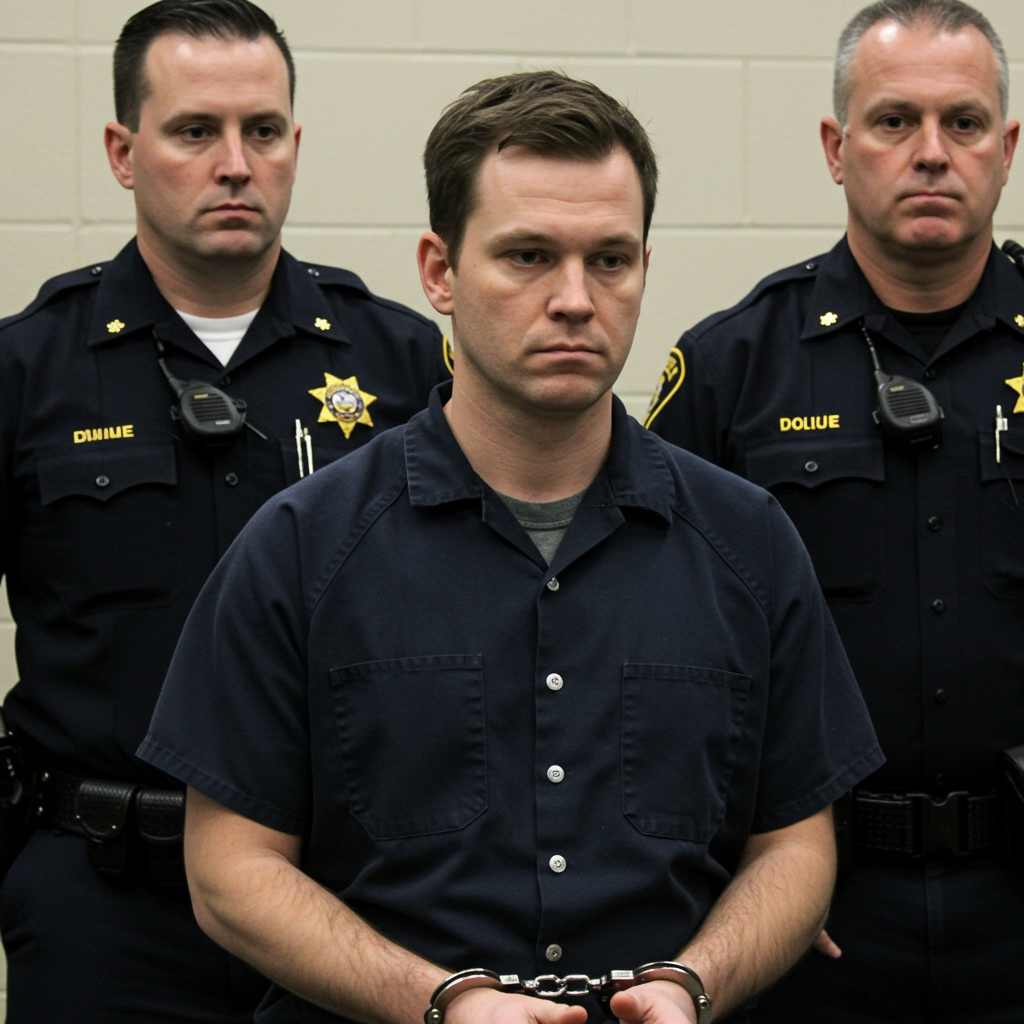In a pivotal moment nearly three years after the horrific 2022 slayings that shook Moscow, Idaho, Bryan Kohberger has been sentenced to four consecutive life terms without the possibility of parole. This definitive judgment, handed down on July 23, 2025, brings a measure of closure for the families of University of Idaho students Madison Mogen, Kaylee Goncalves, Xana Kernodle, and Ethan Chapin, whose lives were brutally cut short. The sentencing hearing was an emotionally charged event, where profound grief and raw anger from the victims’ loved ones filled the courtroom, confronting Kohberger directly with the devastating impact of his actions.
The Verdict: Life Without Parole for Idaho Murders
Judge Steven Hippler delivered the stern sentence against Bryan Kohberger, solidifying his fate. For the first-degree murders of the four University of Idaho students, Kohberger will serve four consecutive life sentences, ensuring he will never be released from prison. Additionally, he received an extra 10-year term for a burglary charge and was ordered to pay $270,000 in fines and civil penalties. This outcome follows Kohberger’s surprise guilty plea on July 2, 2025, a decision that allowed him to avoid the death penalty, a path prosecutors had initially pursued.
A Painful Decision: The Plea Agreement Explained
The decision by Latah County Prosecutor Bill Thompson to offer a plea deal was a strategic move aimed at preventing “decades” of protracted court proceedings and appeals. While effective in securing a conviction, this agreement was not universally welcomed by the victims’ families. Prosecutor Thompson acknowledged that some relatives, particularly those of Kaylee Goncalves, expressed significant anger and disappointment, feeling it was an “easy way out” that offered no new answers. The prosecution emphasized that legal limitations prevent the court from mandating a detailed “factual allocution” or explanation of motives from a defendant as part of a plea deal, and Thompson himself expressed a lack of trust in any statement Kohberger might provide.
Voices of Anguish: Victims’ Families Confront Kohberger
The sentencing hearing was dominated by powerful and heart-wrenching victim impact statements. For over two hours, family members delivered their messages directly to Bryan Kohberger, who remained notably expressionless throughout. Alivea Goncalves, Kaylee’s sister, condemned Kohberger as a “sociopath, psychopath, murderer,” a “coward,” and a “delusional, pathetic, hypochondriac loser.” She fiercely asserted that Kaylee would have “kicked your f*ing ass” had he not attacked them in their sleep, earning a standing ovation for her raw honesty.
Kristi Goncalves, Kaylee’s mother, conveyed her constant pain and expressed disappointment that Kohberger would not face a firing squad, confidently adding, “the men in prison will have their way with you.” Randy Davis, Xana Kernodle’s stepfather, visibly trembled as he called Kohberger “evil” and declared, “You’re gonna go to hell.” He even expressed a desire for “five minutes out in the woods” with the killer. In a contrasting display, Cara Northington, Xana’s mother, shared that she had found forgiveness through her faith. Xana’s father, Jeff Kernodle, voiced deep regret for not being at the house that fateful night, believing the victims might have had a chance. Jazzmin Kernodle, Xana’s sister, focused on the justice for the victims, not Kohberger, noting no sentence could truly equate to what they deserved.
Maddie Mogen’s stepfather, Scott Laramie, spoke on behalf of her mother, describing Maddie as having made their lives “extraordinary.” He expressed support for the plea agreement, highlighting the need to protect society from such evil. Ben Mogen, Maddie’s father, became emotional, stating his daughter was his “only great thing” and crediting her with keeping him alive through addiction struggles. Karen Laramie, Maddie’s mother, chose not to address Kohberger directly in her statement, stating her family might never forgive him. The two surviving roommates, Dylan Mortenson and Bethany Funke, also shared their profound trauma and ongoing struggles, with Mortenson recounting panic attacks and persistent fear. When Judge Hippler offered him the chance to speak, Bryan Kohberger uttered only “I respectfully decline,” drawing immediate reactions of “coward” from the courtroom.
The Enduring Mystery: Unanswered Questions Remain
Despite the finality of the sentence, key questions surrounding the brutal murders persist. Law enforcement officials, including Lead Detective Brett Payne of the Moscow Police Department, conceded that Bryan Kohberger’s motive for targeting the particular house remains unknown. They found no evidence he was following the victims’ social media or that any specific victim was the primary target. Furthermore, the murder weapon, the knife used in the horrific killings, has never been found. Prosecutor Bill Thompson clarified there was no evidence suggesting Kohberger was a “serial killer in waiting” or had any significant prior criminal history or violent predispositions. Police have indicated they plan to release all investigation reports.
Judge’s Condemnation and Community Reflection
Judge Steven Hippler delivered emotional remarks, calling Kohberger’s actions an “unfathomable and senseless act of evil” and a “senseless slaughter” that caused “immeasurable pain and loss.” He expressed his view that continuing to focus on the “why” would give Kohberger undue “relevance,” stating that “there is no reason for these crimes that could approach anything resembling rationality.” Hippler concluded by asserting that Kohberger’s actions made him “the worst of the worst,” noting the complete absence of any hint of remorse.
Idaho State Police Col. Bill Gardiner publicly thanked investigators and the victims’ families, citing their “strength” and “love” as inspiring. The White House, through Press Secretary Karoline Leavitt, offered condolences, stating the nation grieves with the families. Leavitt also echoed former President Trump’s prior sentiment that the president would have liked to force Kohberger to publicly explain his actions. The brutal crime profoundly impacted the quiet college town of Moscow, causing widespread fear and anxiety, with many students opting to leave town and shift to remote classes. In the wake of the tragedy, foundations like “Ethan’s Smile Foundation” and “Made With Kindness Foundation,” along with the University of Idaho’s “Vandal Healing Garden and Memorial,” have been established to honor the victims’ legacies.
The Path to Justice: How Evidence Led to Kohberger
The journey to identify and apprehend Bryan Kohberger was a complex investigative challenge. A significant breakthrough came from a large knife sheath discovered near Madison Mogen’s body, which yielded a single trace of male DNA. Surveillance footage played a crucial role, capturing a white Hyundai Elantra, later identified as Kohberger’s vehicle, circling the crime scene area around the time of the killings. Authorities painstakingly utilized genetic genealogy to link the DNA evidence directly to Kohberger, and further corroborating evidence included his phone records, which placed him near the crime scene. His online purchase history also revealed he had bought a military-style knife and a matching sheath. Nearly six weeks after the slayings, Kohberger was taken into custody in Pennsylvania. The sweeping gag order, which had previously restricted information dissemination to ensure an impartial jury, was lifted prior to the sentencing due to the plea deal, despite defense objections, with Judge Hippler emphasizing the public’s right to information.
Frequently Asked Questions
What was the final outcome of Bryan Kohberger’s sentencing?
Bryan Kohberger was sentenced on July 23, 2025, to four consecutive life terms in prison without the possibility of parole. He also received an additional 10-year sentence for a burglary charge and was ordered to pay $270,000 in fines and civil penalties. This sentencing followed his guilty plea to the 2022 murders of four University of Idaho students, Madison Mogen, Kaylee Goncalves, Xana Kernodle, and Ethan Chapin.
Why did Bryan Kohberger’s motive for the Idaho murders remain unknown?
Despite the sentencing, Bryan Kohberger’s motive for the brutal killings remains unknown. Law enforcement officials, including the Moscow Police Department, stated there was no known link between Kohberger and the victims, nor could they determine a specific target or reason for choosing that particular house. The murder weapon has also never been found. Prosecutors explained that legal frameworks do not allow them to compel a defendant to provide a detailed explanation of their actions or motives as part of a plea deal.
How did the plea deal impact the sentencing process for the Idaho murder case?
The plea deal allowed Bryan Kohberger to avoid the death penalty, a path initially sought by prosecutors. Prosecutor Bill Thompson explained this decision was made to circumvent potentially “decades” of complex court proceedings and appeals that a capital punishment case would entail. While securing a conviction and avoiding a lengthy trial, the plea deal was met with mixed reactions from victims’ families, with some expressing anger and disappointment that it offered no answers or the “easy way out” for Kohberger.
The sentencing of Bryan Kohberger marks a significant chapter in a case that has captivated and horrified the nation. While the finality of a life sentence without parole brings a form of legal closure, the profound anguish of the victims’ families and the enduring mystery of Kohberger’s motive continue to resonate. The community of Moscow, Idaho, and beyond, strives to move forward, honoring the memories of Madison, Kaylee, Xana, and Ethan, even as unanswered questions about that tragic November night persist. This outcome underscores the complex balance of justice, legal strategy, and the human desire for understanding in the face of incomprehensible evil.



